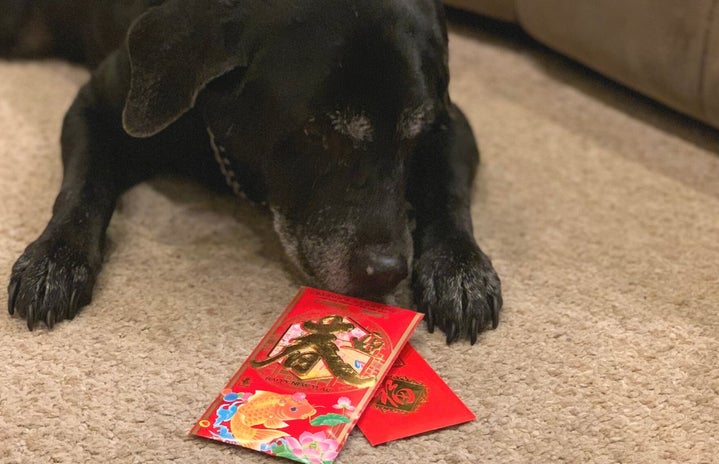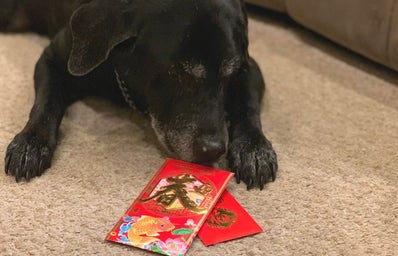“Do you know the story of the rat and all the other zodiacs?” my dad asks. It’s Sunday morning, the day after the Lunar New Year.
Like with anything my dad tells me, I take the tale with a grain of salt. He’s always had a very imaginative, meandering way of telling me things. This time, he tells me that a long time ago, the 12 animals of the Asian zodiac were once in a race to a finish line, not unlike Aesop’s “Tortoise and the Hare.” The zodiac was deemed in the order that the animals finished the race, and the rat was funny because it had hopped onto the ear of an ox to cross a raging river, winning the race at the very last minute by jumping off of the ox and crossing the finish line.
“I’m not sure if that’s the true story or if I made that up,” my dad says with a laugh. “But that’s how it goes. The rat, ox, tiger, rabbit, dragon…” he rattles them off in Vietnamese, and it sounds familiar even though I don’t speak the language.
Lunar New Year is a very special holiday in many East and Southeast Asian countries celebrating the beginning of another trip around the sun. In Vietnam, New Year is called Tết. Around the world, it’s a weeklong celebration categorized by elaborate red lantern festivals and fireworks and buffets of all the food you could possibly want to eat. There’s a cycle of 12 animals of the Asian zodiac beginning with the rat and ending with the pig before starting all over again.
Like with anything, there are cultural differences in how each country celebrates—the traditional foods eaten, the ceremonies and festivals—but there is also a lot of overlap. Most of the animals representing each zodiac are the same with only a few differences—sometimes it’s a sheep, sometimes it’s a ram, sometimes a goat. I’m a dragon, born in 2000. It’s said that when your zodiac’s year comes around, it’s going to be a year of good luck and prosperity.

In my family’s little corner of the world, New Year has always been a quieter weekend of celebration. For some years, my mom makes a traditional dish (this year it was an egg noodle soup dish called mì hoành thánh). We go out to eat on other years. We stock up the week before on offertory fruits on a big platter—watermelon, oranges, papaya, mango—and dig in on the day of.
My mom always reminds us that we have to do all our laundry the night before New Year’s Day or wait to do it afterward—an old superstition about not wanting to wash away all the good luck the past year has brought. She also reminds us to help clean the house (even more than she usually would). Another superstition—this time one about getting rid of all the bad luck in the house before the new year begins.
Evidently, the Lunar New Year involves a lot of superstitions about luck. I think a lot of Asian cultures are superstitious in general, but it made for a lot of fun growing up. My parents always told us that the first person to walk into the house on New Year’s Day would have the best luck all year. Cue the races through the front door every year—sometimes, my brother and I would joke about how our dog beats us inside.
I guess this brings us to the most important part of Tết: family. This year felt a little untraditional—my brother and I are both off at college, so all four of us were only together for a day before he and I had to go back to school. Most of my extended family lives in other states, too. But, Tết brings about a lot of texts and phone calls. So somehow the distance between all of us seems a little less.

Every year, my parents tell me and my brother the same thing. “Make sure you call Grandpa and all your aunts and uncles. Chúc Mừng Năm Mới.” Which, fittingly, means “Happy New Year.” It’s some of the only Vietnamese I’ve learned to correctly say in all my 19 years of life, and for that reason it remains very special to me. New Year has always been very special to me.
Asian cultures place a lot of emphasis on family, but specifically on appreciation of your older relatives and ancestors. This is where the red envelopes come in, carrying eagerly awaited lucky money. Called “li xi” in Vietnamese, the envelopes are less about the money and more about the sentiments behind giving it. Parents, grandparents, aunts and uncles who give out red envelopes are wishing their kids a year of good health, prosperity and happiness. And yes, luck too.
After a little bit of reading, it turns out my dad was right about that old story. I imagine that his parents once told him the same thing. I think a lot of the beauty of holidays such as Tết lies in that sentiment—of passing down old stories and traditions that keep the culture alive. At least, that’s what I think is most beautiful about it. It makes me excited to keep the stories and traditions alive when I eventually have my own family.
So, Happy New Year! It’s the Year of the Rat—first of the zodiacs and representative of the beginning of a new day. Take it as a fresh start, and good luck!

All images courtesy of Adriana Nguyen.
Want to see more HCFSU? Be sure to like us on Facebook and follow us on Instagram, Twitter and Pinterest!



